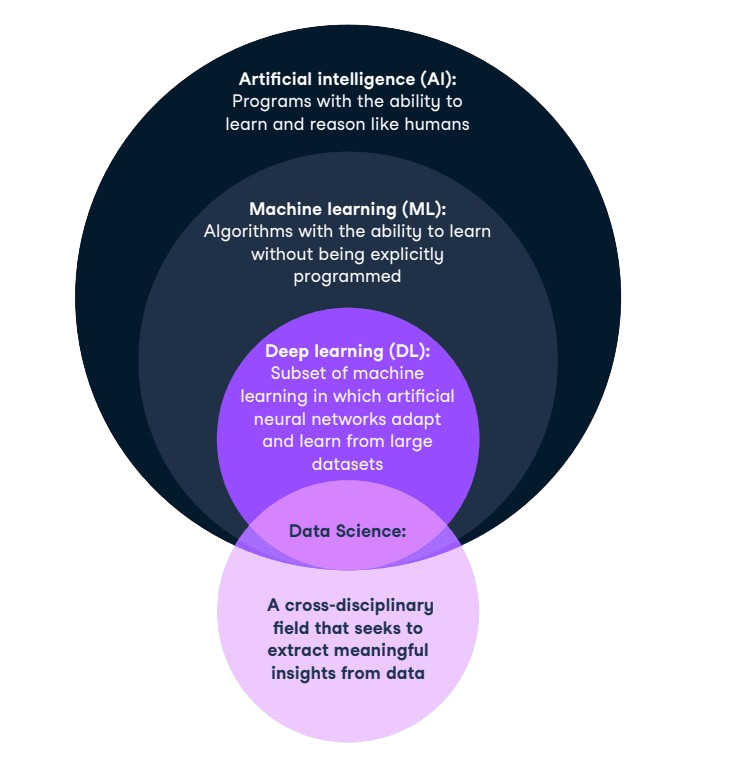How to Become an AI Engineer
One year after the release of ChatGPT, Artificial Intelligence (AI) couldn’t be more popular and ubiquitous. Nearly every sector and industry is likely to experience deep changes due to the implementation of AI.
The ongoing AI revolution comes with endless possibilities. But to deliver its promises, AI needs to be integrated into the day-to-day operations of businesses and governments. That involves a lot of work, which translates into the urgent need for professionals with AI skills to build these products and applications.
One role that is particularly needed for the successful implementation of AI solutions is that of the AI engineer. Overall, an AI engineer is responsible for the design, development, and implementation of solutions and applications that enable machines to perform tasks that would typically require human intelligence.
In this article, we will explain everything you need to know to get started as an AI engineer. If you're a data professional willing to start a new role, an AI researcher, or just an AI passionate, this guide is for you. We will cover the details of the role of an AI engineer, the typical background and skills of these highly demanded professionals, and what to expect once you land your first job as an AI engineer. Let’s go!
The Role of an AI Engineer
AI engineers play a vital role for companies willing to leverage the power of AI. They are responsible for integrating AI-based tools and solutions into the daily operations of companies.
To do their job, AI engineers require a mixed and extensive background that combines knowledge from various areas, such as AI, Machine Learning (ML), data science, and software engineering, as well as a deep understanding of the nature and organization of the company they work for.
That’s why, despite this highly technical background, AI engineering is normally associated with leadership-oriented roles. This involves overseeing complex and challenging projects, engaging with clients, and effectively managing and leading teams.
AI Engineering vs ML Engineering
When speaking about AI engineering, it’s important not to confuse it with ML engineering. While there are some obvious overlaps between the two roles, several aspects set them apart.
To better understand the differences, let’s first have a look at the definitions of these two closely related terms.
- Artificial Intelligence is a broad field of computer science that focuses on creating intelligent systems capable of performing tasks that would normally require human intelligence. It encompasses a broad set of tools and techniques for making computers behave intelligently and in an automated fashion. Check out our full guide, What is AI? to find out more.
- Machine Learning is a specialized branch within AI, primarily aimed at designing and fine-tuning algorithms that become more accurate and efficient as they interact with data over time. Put simply, ML equips computers with the ability to analyze data, draw insights, and make informed decisions or forecasts, all without requiring explicit programming for these tasks. To better understand how AI is different from machine learning, we highly recommend you read our comparative guide.

Source: DataCamp
Based on these definitions, the main difference between AI engineering and ML engineering lies in the scope of work. ML engineers mainly focus on developing and fine-tuning models, as well as scaling them to the production level for deployment as ML products. This requires a combination of knowledge and skills from software engineering and data science. You can read more about how to become an ML engineer in a separate article.
By contrast, AI engineers can work on a variety of technologies and tasks to develop different forms of machine intelligence. Yet ML algorithms and data-driven applications may be predominant depending on the company and the position, AI engineers also deal with other types of AI, such as robotics, natural language understanding, or rule-based expert systems.
How to Become an AI Engineer: Educational Pathway
As is often the case with emerging jobs, there’s no single route to land your first job as an AI engineer. Depending on your background, level of seniority, and time availability, some routes will fit your needs better than others.
Let’s see the different educational pathways that can help you get into AI engineering.
Undergraduate Education
In recent years, colleges around the world have started to offer undergraduate degrees in AI and ML. This is very good news for the industry, and it’s a great choice if you’re about to start your university studies.
Yet, given the interdisciplinary nature of AI, you can also opt for other programs that can help you get some of the skills and knowledge required to get into AI engineering. Some examples are bachelor's degrees in Data Science, Computer Science, Software Development, or Math.
Postgraduate Education
A master's degree in AI or any related field is a great choice to expand your knowledge and acquire new skills after your bachelor's degree or for those experienced professionals willing to move into AI engineering. Nowadays, there are plenty of options to meet your needs in terms of budget, time, and availability.
Courses and Career Tracks
Online boot camps or data science platforms can be a quicker and more affordable way to learn the skills required for AI engineering. At DataCamp, we’re working hard to provide interactive and insightful courses on AI for all levels. Whether you’re an aspiring data professional or a data leader, we get you covered with a comprehensive catalog of courses and career tracks.
Here are some of the best AI-related courses and career tracks on DataCamp:
- Understanding Artificial Intelligence Course
- Machine Learning Fundamentals with Python
- Introduction to Deep Learning with PyTorch
- Machine Learning Scientist with Python Career Track
- AI Fundamentals Career Track
Certifications and Specialized Training
A great way to prove your AI skills and get an advantage in the job market is by getting an AI certification.
AI certifications are typically awarded by professional bodies or educational institutions and involve a rigorous assessment process. To obtain certification, candidates are usually required to pass an exam or a series of exams that test their knowledge and skills in specific areas of AI.
There are many AI certification providers. One of them is DataCamp. Created in partnership with industry leaders based on the latest industry demands, DataCamp Certifications can help you stand out in the competitive AI job market.
Willing to get certified? Read our guide with the top AI Certifications for 2024 to know more about the process.
Developing AI Engineer Skills
AI engineers work at the intersection of software engineers and data professionals. Due to its interdisciplinary nature, you’ll have to be fluent in foundational data science skills and have a solid background in software engineering concepts.
At the same time, AI engineers need to be familiar with the different forms of machine intelligence. Depending on the company and the position, they will need to be ready to work in areas like robotics, computer vision, speech recognition, and rule-based expert systems.
Let’s dive deeper into the most common skills needed to give you a better idea of what you’d need to demonstrate.
Technical Skills
Programming
AI implementation requires a sound understanding of programming. Knowing how to write code allows you to develop AI algorithms, manipulate data, and use AI tools and libraries. Python is currently the most popular language in the AI community due to its simplicity, flexibility, and availability of data science libraries. But there are also other programming languages worth considering, such as R, and Julia. Here are some DataCamp resources to help you in your programming journey.
- Python Programming Skill Track will help you improve your Python programming skills. You’ll learn how to optimize code, write functions and unit tests, and use software engineering best practices.
- R Programming Skill Track, similarly, in this track, you’ll level up your R programming skills by learning how to work with common data structures, optimize code, and write your own functions.
- Julia Fundamentals Skill Track. Discover the potential of Julia, a versatile and high-performance programming language specifically designed for data science.
Machine Learning
ML is currently the most popular branch of AI. A fraction of your work as an AI engineer will likely involve developing and fine-tuning ML models, as well as turning them into products. Hence, It's essential to understand different machine learning algorithms, how they work, when to use them, and so on.
Below, you can find some resources to start learning now.
- Machine Learning Fundamentals with Python Skill Track, teaches you the machine learning fundamentals and the science behind it, covering prediction, pattern recognition, and the deep learning basics.
- Machine Learning Fundamentals in R Skill Track, where you’ll learn to predict categorical and numeric responses via classification and regression, and discover the hidden structure of datasets with unsupervised learning.
Al Algorithms
In addition to ML, there are other subfields of AI where AI engineers must be well-versed. The exact field will depend on the company you work for and the nature of the position, but, still, the more you know, the better. Here are some recommendations for topics you should be familiar with.
- Image Processing with Python Skill Track. This track will provide you with the tools to manipulate and extract information from images.
- Natural Language Understanding in Python Skill Track. Most of the data out there comes from human communication. Whether to extract information from text data or teach machines how to generate human-like responses, such as ChatGPT, learning NLP is a must for AI engineers.
- Spoken Language Processing in Python Course with Speech Recognition. In this course, you will learn how to train machines to identify and process human speech.
Big Data
Next-generation AI algorithms are powered by vast amounts of data. When dealing with such volumes of data, traditional tools like Python or R may not be the most efficient solutions. To work in big data projects, new tools, like Apache Spark and NoSQL databases, and methodologies, such as parallel computation and cloud computing, will be required.
- Big Data with PySpark Skill Track. This track will introduce you to Spark, a popular and powerful framework for parallel computation.
- Understanding Cloud Computing Course. A great course to get you started in cloud computing, covering key concepts, terminology, and tools.
Software Engineering
The final deliverable for a machine learning engineer is workable software. Careful thought about how the system is designed must go into the development of AI systems to scale well with increasing data.
Further, an AI system is just a minor component that must fit into a more extensive and complex system. Thus, an AI engineer must understand various software engineering best practices (i.e., version control, testing, documentation, modular coding, etc.) and how the different pieces form a system. You’ll be required to build an appropriate interface for your systems to effectively communicate with components in the system.
- Introduction to Shell Course. The Unix command line helps AI engineers combine existing programs in new ways, automate repetitive tasks, and run programs on clusters and clouds.
Soft Skills
- Problem-solving. Developing and operating AI algorithms is a complex task that requires a deep understanding of the system they will be integrated into. AI engineers need to have a global vision of the process and find a way to align technologies, business needs, deadlines, and resources to ensure the success of the project.
- Teamwork. Given the complexity of developing and integrating AI systems, pretending that the job can be done by just one person is naive and counterproductive. Part of the responsibility of AI engineers is to engage with and manage the work of the teams and departments involved in the project.
- Communication skills. Last but not least, data engineers also need communication skills to work across departments and understand the needs of data analysts and data scientists as well as business leaders. Depending on the organization, data engineers may also need to know how to develop dashboards, reports, and other visualizations to communicate with stakeholders.
Gaining Practical AI Engineering Experience
Learning to become an AI engineer can be an exciting endeavor, but it’s not without its challenges. It is a broad field with many subtopics, and depending on your starting point, it may take a considerable time to pick all the necessary skills and knowledge.
Having said this, in addition to educational resources, getting practical experience is key to consolidating your knowledge. Applying the skills you learn in real-world projects solidifies your understanding and gives you practical experience that can enrich your profile and help you stand up on the job market.
Below you can find a list of activities and strategies that can help you get AI hands-on experience.
- Internships. Finding your dream job in the AI industry can be difficult, especially if you are in the first stages of your career and lack professional experience. A great way to find your way in the job market is by doing an internship. An internship is a work-learning opportunity that offers a chance for students to get professional experience and make valuable connections with other AI practitioners.
- Developing personal AI projects. Working on your one project is a critical step to building your portfolio and training your skills. If you are at this stage, we highly recommend you read our guide on How to build a great data science portfolio as well as our AI projects post.
- Code along. If you want to learn from experts and discover how they resolve real-world problems, you should try DataCamp Code Alongs. Have a look at our code along the section and be ready to code hand in hand with AI leaders in multiple projects.
AI Engineer Career Opportunities and Growth
Career Paths in AI Engineering
Given the transformative power of AI, as illustrated by next-generation tools like ChatpGPT, it’s not surprising the rapid growth of AI-related positions.
According to the World Economic Forum’s Future of Jobs report, AI and machine learning specialists lead the list of fast-growing jobs over the next five years. As industries continue to adopt AI technologies to streamline their operations and make better decisions, the demand for AI engineers will likely only increase.
This prediction is further emphasized in the projected AI market size growth between 2021 and 2030, as seen below.

Source: Statista
Given the transformative potential of AI, there will be job opportunities for AI engineers in nearly every industry and sector, from tech and finance to marketing and manufacturing.
Salary Expectations
We’ve got a full guide on AI engineer salaries, which explores the topic in more detail. Here, we’ve outlined some of the essential information.
Organizations across countries and industries are competing for AI engineers to implement AI solutions. However, since the supply of AI professionals has not yet caught up with the demand, the competition between companies in hiring these professionals is fierce compared to other tech sectors. As a result, employers are willing to pay top salaries to talented AI engineers.
According to Glassdoor, the estimated total pay for an AI Engineer in the US ranges between $124K - $193K per year, although the salary can be influenced by several factors, such as seniority, location, education, and knowledge in certain niche areas within Ai.

Source: Glassdoor
Conclusion
AI is living in a golden age. Companies around the world are desperately looking for AI talent to implement AI in their business. AI engineers are among the most in-demand profiles in data science nowadays. We hope this article helps you discover the details about the popular and lucrative role.
If you want to get started in AI engineering, DataCamp is here to help. Check our dedicated content to learn more and start your learning journey today:
- AI Fundamentals Career Track
- Machine Learning Scientist with Python Career Track
- How to Become a Machine Learning Engineer
- How to Learn AI From Scratch in 2024: A Complete Expert Guide
- How Much Do AI Engineers Make? A Guide to Salaries in 2023
- The Top AI Certifications for 2024: A Guide to Advancing Your Tech Career
- What is Prompt Engineering? A Detailed Guide

Code Along Series: Become an AI Developer
Build AI Systems and develop AI Applications using OpenAI, LangChain, Pinecone and Hugging Face!
blog
What is Llama 3? The Experts' View on The Next Generation of Open Source LLMs
blog
Attention Mechanism in LLMs: An Intuitive Explanation
Yesha Shastri
8 min
blog
Top 13 ChatGPT Wrappers to Maximize Functionality and Efficiency
Bex Tuychiev
5 min
podcast
How Walmart Leverages Data & AI with Swati Kirti, Sr Director of Data Science at Walmart
podcast
Creating an AI-First Culture with Sanjay Srivastava, Chief Digital Strategist at Genpact
tutorial
How to Improve RAG Performance: 5 Key Techniques with Examples
Eugenia Anello